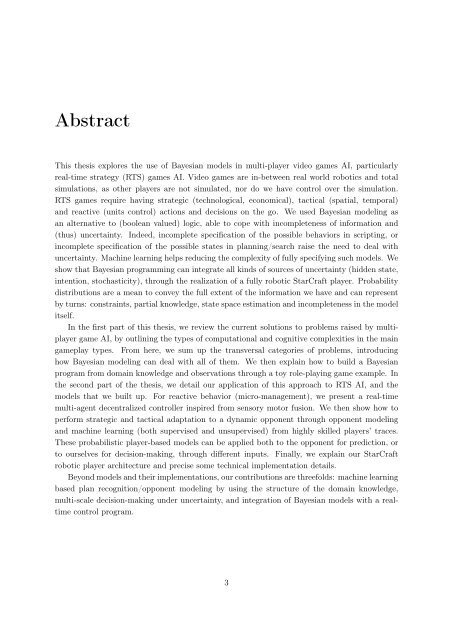Bayesian Programming and Learning for Multi-Player Video Games ...
Bayesian Programming and Learning for Multi-Player Video Games ...
Bayesian Programming and Learning for Multi-Player Video Games ...
Create successful ePaper yourself
Turn your PDF publications into a flip-book with our unique Google optimized e-Paper software.
Abstract<br />
This thesis explores the use of <strong>Bayesian</strong> models in multi-player video games AI, particularly<br />
real-time strategy (RTS) games AI. <strong>Video</strong> games are in-between real world robotics <strong>and</strong> total<br />
simulations, as other players are not simulated, nor do we have control over the simulation.<br />
RTS games require having strategic (technological, economical), tactical (spatial, temporal)<br />
<strong>and</strong> reactive (units control) actions <strong>and</strong> decisions on the go. We used <strong>Bayesian</strong> modeling as<br />
an alternative to (boolean valued) logic, able to cope with incompleteness of in<strong>for</strong>mation <strong>and</strong><br />
(thus) uncertainty. Indeed, incomplete specification of the possible behaviors in scripting, or<br />
incomplete specification of the possible states in planning/search raise the need to deal with<br />
uncertainty. Machine learning helps reducing the complexity of fully specifying such models. We<br />
show that <strong>Bayesian</strong> programming can integrate all kinds of sources of uncertainty (hidden state,<br />
intention, stochasticity), through the realization of a fully robotic StarCraft player. Probability<br />
distributions are a mean to convey the full extent of the in<strong>for</strong>mation we have <strong>and</strong> can represent<br />
by turns: constraints, partial knowledge, state space estimation <strong>and</strong> incompleteness in the model<br />
itself.<br />
In the first part of this thesis, we review the current solutions to problems raised by multiplayer<br />
game AI, by outlining the types of computational <strong>and</strong> cognitive complexities in the main<br />
gameplay types. From here, we sum up the transversal categories of problems, introducing<br />
how <strong>Bayesian</strong> modeling can deal with all of them. We then explain how to build a <strong>Bayesian</strong><br />
program from domain knowledge <strong>and</strong> observations through a toy role-playing game example. In<br />
the second part of the thesis, we detail our application of this approach to RTS AI, <strong>and</strong> the<br />
models that we built up. For reactive behavior (micro-management), we present a real-time<br />
multi-agent decentralized controller inspired from sensory motor fusion. We then show how to<br />
per<strong>for</strong>m strategic <strong>and</strong> tactical adaptation to a dynamic opponent through opponent modeling<br />
<strong>and</strong> machine learning (both supervised <strong>and</strong> unsupervised) from highly skilled players’ traces.<br />
These probabilistic player-based models can be applied both to the opponent <strong>for</strong> prediction, or<br />
to ourselves <strong>for</strong> decision-making, through different inputs. Finally, we explain our StarCraft<br />
robotic player architecture <strong>and</strong> precise some technical implementation details.<br />
Beyond models <strong>and</strong> their implementations, our contributions are threefolds: machine learning<br />
based plan recognition/opponent modeling by using the structure of the domain knowledge,<br />
multi-scale decision-making under uncertainty, <strong>and</strong> integration of <strong>Bayesian</strong> models with a realtime<br />
control program.<br />
3


